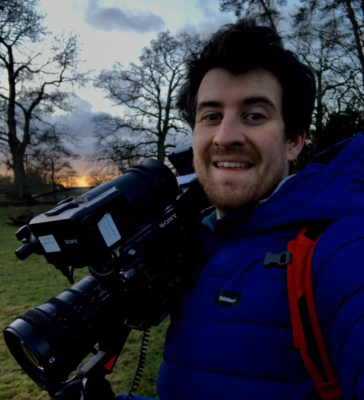
Catarina Oliveira
Current Employer/Organisation Name
Freelance
What have you been doing since leaving Exeter, and what are you doing now?
I moved to Bristol after finishing my Masters Degree in Film Studies, and started working as a freelance filmmaker. Initially I did a mix of motion graphics, editing, producing and filming for various companies and charities, but slowly I started to specialise in editing for TV. These days I am an editor working mainly in unscripted TV. This includes observational documentary, wildlife programmes, children’s shows, and live TV. My credits include BBC’s Blue Planet II and Springwatch.
Why did you choose this career? And what do you enjoy most about your work?
I’ve always been fascinated by the way images and sound can combine to create something much bigger than the sum of its parts. From a young age I knew I wanted to work in a creative sector, but wasn’t sure what that would look like. I had an interest in drawing, photography, languages, geography, and culture. When I started getting involved in making short films, I realised how much I enjoyed the process of telling stories through audio-visual means, and I realised that being a documentary filmmaker was a way of combining a lot of my interests into one job. Editing, in particular, requires an understanding of story structure, pacing, musicality, and visual culture. My role is to find the best way to tell a story with the material available to me. I find it immensely rewarding.
Please tell us if you were a member of any societies, groups or sports clubs?
I was involved with the Film Club.
What did you enjoy most about your programme and what was the biggest highlight?
I enjoyed the fact that the Film Studies programme didn’t focus on just classic Hollywood cinema, there was a variety of modules dedicated to non-mainstream subjects and we had the freedom to choose what type of cinema we’d like to focus on – there was no such thing as ‘too obscure’ or ‘too niche’! I learned a lot about issues of identity and representation in film by looking at the cinema of small nations, and learned about British culture and history by studying films of the Thatcher era.
What did you enjoy most about studying here?
The year I did my Masters Degree in Exeter was my first year living in the UK, and I enjoyed the experience of being introduced to British culture whilst also being part of a very international environment.
Why did you choose to study at Exeter?
I chose Exeter because its film programme didn’t just focus on mainstream and classic cinema.
What skills and experiences have been most useful for your career?
The analytical and critical thinking skills that I developed during my time studying Film Studies in Exeter have helped me interpret different materials that I need to work with when crafting a documentary. Being able to work independently as well as collaboratively is a crucial set of skills to have in my career, where teamwork and clear communication are essential.
What advice would you give to a current student who wishes to pursue your career?
Getting hands-on experience is absolutely crucial, and I encourage you to start by making your own short films and helping others with their projects, so that you can learn about the different roles that exist in film/tv production, and to help you find out what your main area of interest lies. But don’t just focus on learning about film and filmmaking techniques. Learn about the world around you, whether that’s through nature, science, history, literature, or a specific culture – whatever interests you the most. Having an open mind and a unique way of understanding the world will help you develop your individual voice as a filmmaker.
What are your plans for the future?
My plan is to continue to work as a TV editor. I have a variety of projects lined up for the next few years, and my main goal is to continue to work on interesting projects, telling stories worth telling (regardless of genre), and reaching audiences around the world.

